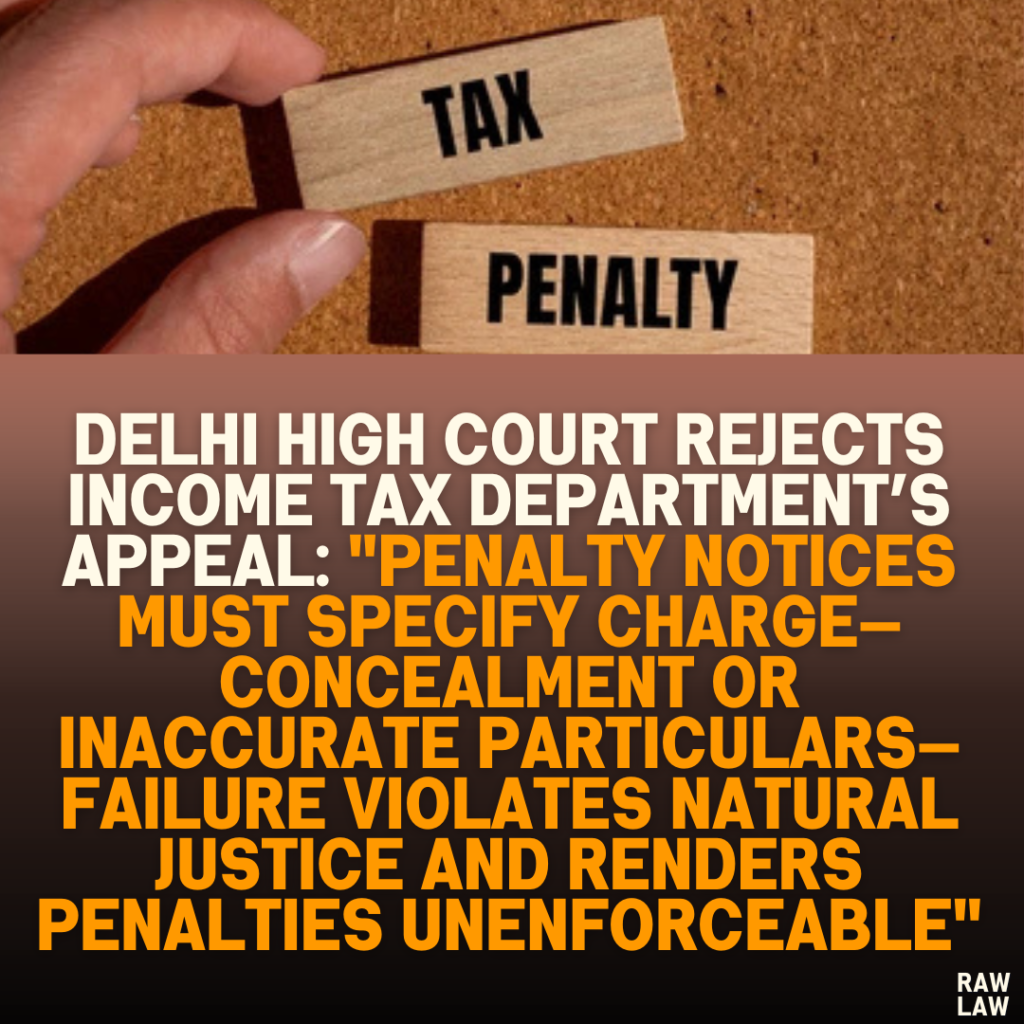Court’s Decision:
The Delhi High Court dismissed the Revenue’s appeals, upholding the ITAT’s ruling that the penalties levied under Section 271(1)(c) of the Income Tax Act were invalid due to vague and unspecific notices. The court held that penalty notices must clearly specify the charge, whether for “concealment of income” or “furnishing inaccurate particulars of income.” Failure to do so violated the principles of natural justice and rendered the penalties unenforceable.
Facts:
- The Revenue filed three appeals against ITAT’s decisions for Assessment Years 2001-02, 2008-09, and 2015-16.
- In each case, the AO had levied penalties under Section 271(1)(c) for disallowed claims made by the assessee:
- The primary disallowances involved advances written off and misclassified expenses that were claimed under business losses.
- The AO imposed penalties without clearly specifying whether they were for “concealment of income” or “furnishing inaccurate particulars.”
- The assessees contested the penalties, arguing that the notices issued under Section 274 (read with Section 271(1)(c)) were vague and deprived them of the opportunity to defend themselves.
Issues:
- Was the ITAT justified in invalidating penalty notices due to vagueness and lack of specificity?
- Did the lack of a clear charge prejudice the assessees’ ability to respond to the penalty proceedings?
Petitioner’s Arguments:
- The Revenue contended that the penalty notices and assessment orders contained sufficient information to apprise the assessees of the reasons for penalty imposition.
- It argued that the vague wording of the notices did not prejudice the assessees since the grounds for penalty were evident from the assessment orders.
- The Revenue maintained that there was an overlap between the two charges under Section 271(1)(c)—”concealment of income” and “furnishing inaccurate particulars”—and that the notices should not be invalidated on technical grounds.
Respondent’s Arguments:
- The assessees contended that the penalty notices were defective as they failed to specify the exact charge being pursued—whether for concealment or furnishing inaccurate particulars.
- They argued that such vagueness deprived them of their right to adequately prepare their defense, as required under the principles of natural justice.
- The respondents relied on legal precedents to support their claim that the absence of a specific charge invalidated the penalties.
Analysis of the Law:
- Section 271(1)(c) of the Income Tax Act deals with penalties for concealment of income or furnishing inaccurate particulars. These two charges carry distinct legal connotations:
- “Concealment of income” involves hiding or suppressing income intentionally.
- “Furnishing inaccurate particulars” refers to providing incorrect details in the return.
- The law requires that the notice initiating penalty proceedings must specify the exact charge, as these proceedings are penal in nature and can lead to severe consequences.
- Section 274 mandates that a notice for penalty proceedings must clearly inform the assessee of the grounds on which the penalty is proposed, allowing them to defend themselves effectively.
Precedent Analysis:
The court relied on the following landmark decisions:
- CIT v. Manjunatha Cotton & Ginning Factory (Karnataka High Court): Held that penalty notices must clearly indicate the specific charge under Section 271(1)(c), failing which the penalty is invalid.
- SSA’s Emerald Meadows (Supreme Court): Affirmed that vague notices under Section 271(1)(c) are defective and unenforceable.
- Reliance Petroproducts (Supreme Court): Observed that merely making an unsustainable claim does not amount to furnishing inaccurate particulars.
- Mohd. Farhan A. Shaikh (Bombay High Court): Clarified that vague penalty notices undermine the assessee’s ability to respond and are prejudicial.
Court’s Reasoning:
- The court emphasized that penalty proceedings are distinct from assessment proceedings and must stand on their own. Vague or omnibus notices fail to satisfy the statutory requirements under Section 271(1)(c).
- It noted that the penalty notices in this case combined both charges—concealment and furnishing inaccurate particulars—without specifying which one was applicable. Such ambiguity violates the principles of natural justice.
- The court highlighted that penalty notices are administrative instruments intended to provide the assessee with a clear understanding of the case against them. When they fail to do so, the proceedings become invalid.
- The court rejected the Revenue’s argument that the defect in the notice could be cured by referencing the assessment order. It held that penalty proceedings must be evaluated independently.
Conclusion:
The Delhi High Court dismissed the Revenue’s appeals, affirming the ITAT’s decision to quash the penalties. It held that the vague and unspecific notices violated statutory requirements and natural justice principles, rendering the penalties invalid.
Implications:
- Stricter Standards for Penalty Notices: This ruling reinforces the requirement for precise and specific penalty notices under Section 271(1)(c).
- Natural Justice: The judgment underscores the importance of adhering to the principles of natural justice in penalty proceedings.
- Safeguards for Taxpayers: Taxpayers are entitled to clear communication of the charges against them, ensuring fairness in tax litigation.
- Administrative Accountability: The judgment serves as a reminder to tax authorities to maintain high standards of procedural compliance in penalty proceedings.
This decision sets a strong precedent for invalidating penalty proceedings initiated through vague and ambiguous notices, thereby safeguarding taxpayers’ rights.




Pingback: Jammu & Kashmir High Court Upholds Preventive Detention Under Public Safety Act, Holds "Public Order Requires Protection Against Acts Jeopardizing the Even Tempo of Life," Validates Detention for Bovine Smuggling and Violent Activities - Raw